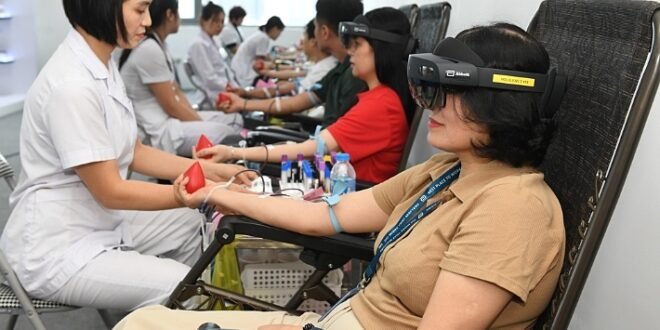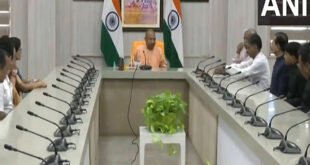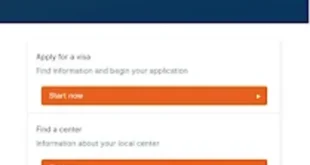Transforming Blood Donation Experiences with Mixed Reality Technology
At a blood donation event in downtown Hanoi, Thanh Thuy, an employee at Abbott Vietnam, had the opportunity to experience the company’s upgraded mixed reality technology. This initiative was part of Abbott’s efforts during three blood donation events held in Ho Chi Minh City and Hanoi, coinciding with World Blood Donor Day on June 14. The program, developed in collaboration with Blood Centers of America, aims to reduce donor anxiety and provide a more engaging experience for those donating blood.
The technology allows donors to enter a digital environment using a headset, where they can enjoy calming music while completing tasks through eye movement. This not only distracts them from the donation process but also ensures that medical professionals can safely carry out the procedure while maintaining engagement with each donor.
This year’s upgraded version of the technology includes two interactive games. Donors can choose to plant seeds in a Zen garden or build a robot team to explore planets and solve puzzles. These activities make the experience more enjoyable and help ease the nerves of first-time donors or those who may feel hesitant about giving blood.
Dr. Nguyen Thi Hong Trang, from the Blood Transfusion Centre at Viet Duc Friendship Hospital, praised the integration of mixed reality technology. After donating blood in Hanoi on June 13, she described the experience as refreshing and engaging. “It’s a great way to encourage more people to donate blood, especially those who may feel hesitant or are donating for the first time,” she said.
Since its launch in the US two years ago, a study by Abbott published in early 2024 showed that 68% of donors with pre-donation anxiety reported reduced anxiety when using mixed reality. Additionally, 89% expressed interest in donating blood again.
This innovative approach aligns with Vietnam’s ongoing campaign to promote voluntary blood donation, which is essential for addressing blood shortages during emergencies and medical treatments. In 2000, Vietnam’s government issued a directive to encourage blood donation, establishing April 7 as National Voluntary Blood Donation Day. Since then, the movement has gained widespread popularity, with significant progress in blood collection.
In 2024, Vietnam collected over 1.7 million units of blood, a substantial increase from 2000 levels. The voluntary donation ratio accounted for 98% of total blood collected, showing a 30% increase over the past four years, according to the National Institute of Haematology and Blood Transfusion.
Abbott’s blood donation events have led to the introduction of mixed reality technology at blood centers in Hanoi and Ho Chi Minh City, allowing more donors in Vietnam to experience the innovation. The incorporation of mixed reality into the blood donation process reflects Abbott’s broader efforts to introduce transformative technologies to improve healthcare and treatment outcomes.
Beyond blood donation, Abbott has made significant contributions to healthcare in Vietnam. Its FreeStyle Libre continuous glucose monitoring system, launched in March 2021, provides people with diabetes and their doctors with detailed insights into glucose levels through a simple scan of the sensor worn on the upper arm. Studies show that users of this system have better glucose control and fewer episodes of hyperglycemia and hypoglycemia, leading to improved overall health outcomes.
Abbott has also made strides in supporting diabetes control in Vietnam with the launch of a reformulated version of Glucerna, which helps improve insulin sensitivity and achieve better glycemic control. The company’s science-based nutrition products, such as Ensure and PediaSure, help strengthen immunity and prevent malnutrition across various life stages.
In diagnostic systems, Abbott’s Alinity platform offers healthcare professionals accurate and fast results, enabling better decision-making, particularly in critical care settings. In cardiovascular care, Abbott’s Xience Drug-Eluting Stents are recognized as the world’s leading drug-eluting stents, providing safety, efficacy, and positive outcomes for patients worldwide. Additionally, the HeartMate 3 Left Ventricular Assist Device and Amplatzer Piccolo Occluder offer advanced treatment options for heart failure and pediatric heart conditions in Vietnam.
From mixed reality in blood donation to life-saving health technologies, Abbott’s diverse innovations highlight its long-standing commitment to improving healthcare worldwide. Since its establishment in Vietnam in 1995, Abbott has invested over VND280 billion (nearly US$11 million) in addressing critical health issues, including improving nutrition, treating chronic diseases, training medical professionals, and raising public awareness about healthcare.
“We are dedicated to bringing our technology and innovations to Vietnam, advancing healthcare, and fostering a healthier, stronger future for all,” said Douglas Kuo, Divisional Vice President and General Manager of Abbott in Vietnam. This year, Abbott celebrates 30 years in Vietnam.
 Info Malang Raya Its All About World News
Info Malang Raya Its All About World News




